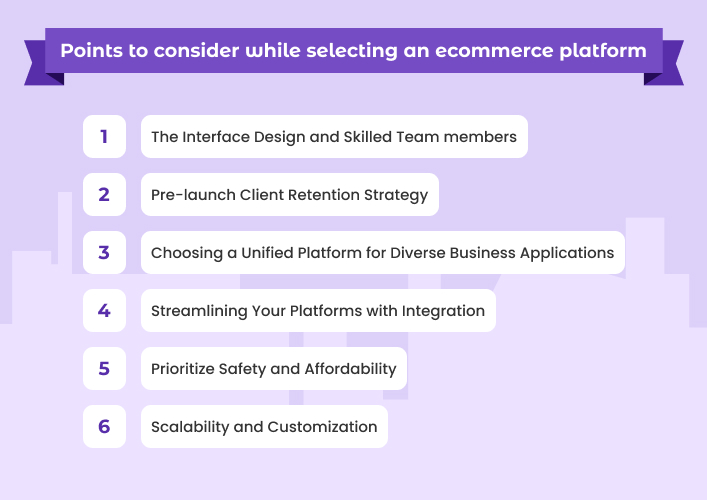Points to consider while selecting an ecommerce platform

- Each platform’s UI is unique, catering to the distinct skills of developers and coders. The interface design, expertise needed to make full use of the system, and skill level of your team members is the main point to consider before selecting the platform.
- Ensure that you have a solid strategy for bringing in your current clientele before launching your new service.
- Businesses that rely on a wide variety of applications (Enterprise Resource Planner (ERP), Product Information Management (PIM), Customer Relationship Management (CRM), Operations Management System (OMS), etc.) should prioritize choosing a platform that can connect with all of these systems.
- The best platforms out there provide a streamlined method of linking together your various pieces of software.
- When deciding on a platform, place a premium on safety features. Furthermore, look into the expenses while selecting a B2B ecommerce platform. It should be budget-friendly and must not have any hidden expenses.
- The platform must be scalable and have enough room for customization.
Key features that make a good B2B ecommerce platform
Customer based price
When a business sells to other businesses, it can set different prices for each type of customer, or each customer group. You should only divide your customers into groups to make their shopping experience more personalized. However, you’ll often need to offer “special” prices on your products to your pickiest customers. This is not the same thing as having low prices. That’s not at all the same approach.
A B2B eCommerce website’s most important feature is the ability to set different base prices for each item in its catalog and assign these prices to different groups of customers. This will determine whether your customers complete their orders online or call or email you to make sure they are fulfilled. If your B2B clients need a totally different set of products or a pricing system that can’t be built into the current products, you’ll need to be able to make products that are only available to certain users on your eCommerce site.
Bulk purchase and discount
Businesses that buy from other businesses usually buy things in large quantities. Your goods can be offered as cases, packs, or boxes, but you may still want to offer different levels of discounts based on how much is being bought. Your eCommerce platforms need to have a way to handle minimum order quantities so that you can offer deals for buying in bulk.
Suppose you want the number of deals to work with the different price levels for each customer. Then you might also want to be able to set different discount levels for each group of customers you have. Thus, the ecommerce platform must have this feature of customization.
Minimum order
A Minimum Order rule tells you how many of a certain item the store will sell at the very least. It’s not possible for the shopper to make an order if they can’t meet the quantity of the minimum order. This happens a lot on bulk websites, where you usually need to buy a certain number of each item before you can place an order. Thus, an ecommerce platform must have this feature to set minimum order amounts for each product.
Reorder products
Instead of having your customers put the same things from a previous sale over and over, make it easy for them to reorder with just one click on your B2B eCommerce platform. Users can be able to see their most recent sales right from their Account page, and there should be a way to start another purchase with the same items as the old one.
Flexible payment methods
Flexible payment methods ensure that a broader audience can access and purchase products from your ecommerce store. By offering various options such as credit/debit cards, digital wallets, bank transfers, and even buy-now-pay-later solutions, you cater to diverse customer preferences and financial situations, fostering inclusivity in your customer base.
Multi-language support
The foreign market can now be reached from anywhere in the world, which has never been possible before. A person in the United States can buy something on Amazon or eBay in China and get it sent to them within a week.
Because the world is so linked, being able to sell abroad is important for long-term growth. Support for multiple languages is the step toward this goal. When you make your ecommerce site, make sure it has a feature to sell globally.
Conclusion
A successful B2B ecommerce platform requires a robust set of features to meet the specific needs of businesses engaged in wholesale transactions. Key features include a user-friendly interface, robust catalog management, seamless integration with existing systems, flexible pricing and payment options, advanced search and filtering capabilities, efficient order management, and best customer support. A comprehensive B2B e-commerce platform should facilitate a seamless and efficient buying process, enhance customer relationships, and contribute to the overall growth and success of businesses.
FAQs
What is the significance of catalog management in a B2B e-commerce platform?
How does integration with existing systems benefit B2B e-commerce platforms?
Why is flexible pricing important in B2B e-commerce?
How does efficient order management contribute to B2B e-commerce success?
What role does responsive customer support play in a B2B e-commerce platform?
Ravi Bhojani is the Chief Marketing Officer (CMO) at Alian Software, where he spearheads the company’s marketing strategies and drives its brand presence in the competitive IT services landscape. With over a decade of experience in the technology and marketing sectors, Ravi has consistently demonstrated his ability to blend innovative marketing techniques with deep industry knowledge to deliver outstanding results.